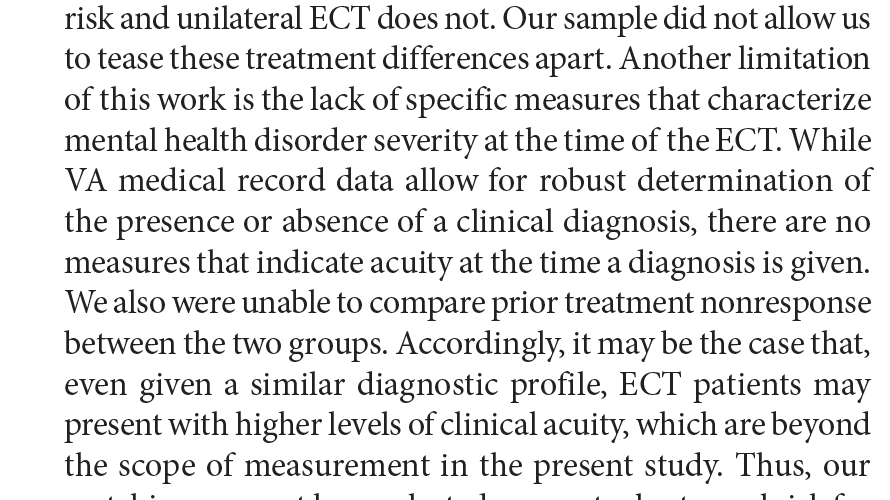ECT and Completed Suicide: New VA Data Analysis

Background: It is currently unclear if a course of electroconvulsive therapy (ECT) is associated with a decreased risk of death by suicide. The limited literature based on evidence either does not reflect contemporary practice or else includes patients receiving as few as one treatment. We sought to examine the association of an adequate exposure to ECT treatment with risk of death by suicide in a present-day sample.
Methods: We conducted a study using electronic medical record data from the Department of Veterans Affairs health system from between 2000 and 2017. We compared all-cause and suicide mortality among patients who received an index course of ECT with a comparison group created through propensity score matching.
Results: Our sample included 5,157 index courses of ECT. The suicide death rate in those receiving ECT was 137.34 deaths per 10,000 in 30 days and 804.39 per 10,000 in 365 days. The rate of death by suicide in the control group was 138.65 per 10,000 in 30 days and 564.52 per 10,000 in 1 year. The relative risk of death by suicide comparing those receiving an index course of ECT and the matched group was 0.96 (95% CI, 0.38-1.55; P = .994) in 30 days and 1.38 (95% CI, 0.88-1.87; P = .10) in 1 year.
Conclusion: The risk of suicide mortality 30 days and 1 year following treatment was similar in patients treated with an index course ECT and in a matched group. There was no evidence that an ECT course decreased the risk of death by suicide.
And from the text:

And just to be clear:
This large epidemiological study is sure to get a lot of attention and possibly be used to denigrate ECT. In the introduction, the authors state, "Notably, more recent work has called that effectiveness [acute efficacy of ECT] into question." One of the two references to that sentence is from Read and Bentall. To call their review "work" seems to me to be extreme sloppiness on the part of the authors, or worse. More fundamentally, the limitation of not matching for acute illness severity seems like a major flaw to me. Patients who get ECT are almost always more severely ill than other groups. And the authors' caveats about ECT in the VA system are well taken. Overall, the VA does relatively little ECT and we know little about the quality. For disclosure, I did ECT in the VA system for years, so I am not without firsthand experience.
All ECT practitioners should read this paper in full, and please join the discussion!
[NB: A more recent study (yesterday) in Lancet Psychiatry arrives at a different conclusion...]





Comments
Post a Comment